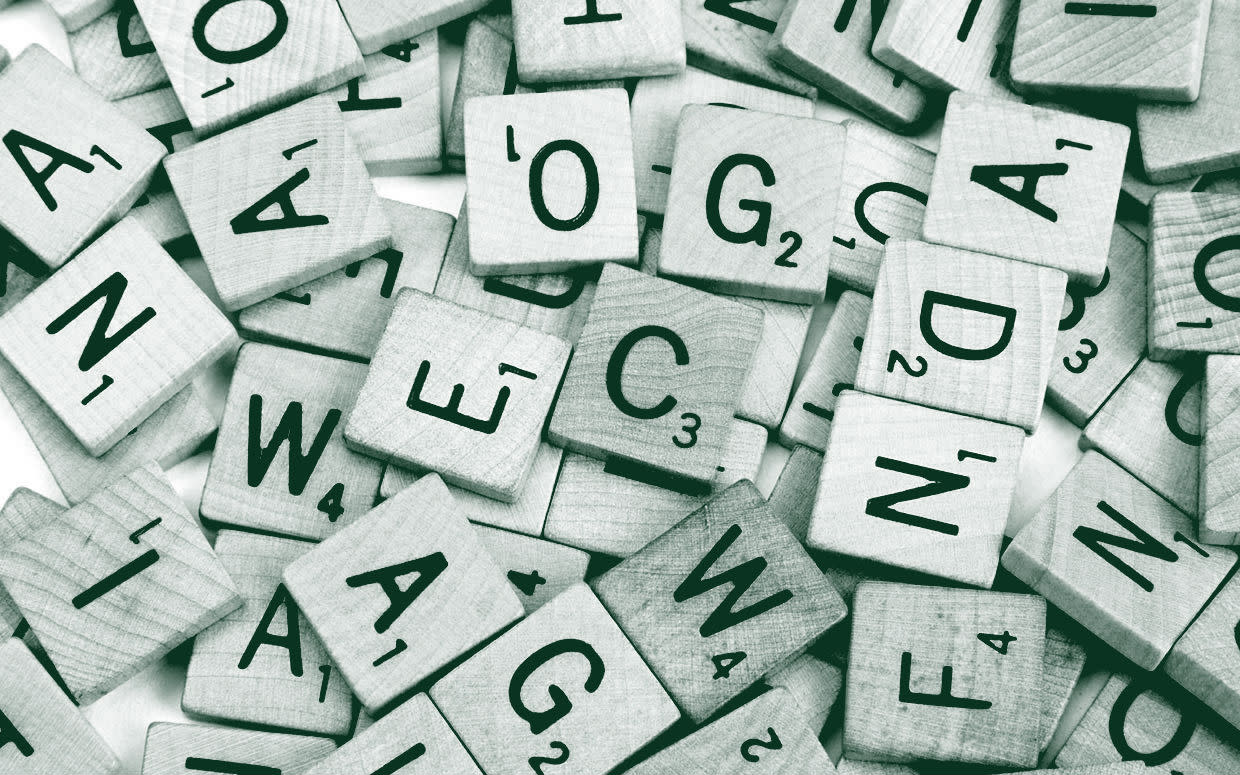Finding common ground one letter at a time.
NATALIE DAHER
The first time I fell in love, we bonded in the early stages through phone Scrabble. “Scrabble back,” he’d text me, if a few hours passed without my next move. This was pre-Tinder, and our matches got heated. We eventually spent enough years together to re-download the app for a burst of nostalgia in our long-distance monogamy.
As our relationship wore on, Newtoy’s then-wildly popular Words with Friends became available on my Android, like the Snapchat app we’d use to sext. Then came Scramble with Friends (renamed Word Streak), which really spiced things up.
To me, word games will always be kind of romantic: a throwback to simpler times. They’re nerdy, but nobody really cares that much if you underperform. There’s space to slack, to try too hard, or to embarrass yourself only in front of a bot.
On Wikipedia, a website predicated on people volunteering to write and edit words, “word games” are categorized by type. There’s letter arrangement (Scrabble), puzzle (crossword), structured (Mad Libs), or linguistic recreations (spelling bees).
These games predate artificial intelligence by eons, well before Siri had all the answers and Merriam-Webster Dictionary started dragging people on Twitter.
Words, one of the most basic forms of communication, can be primal. Like puzzles—or a budding relationship—they can leave us vulnerable or confused. Choosing the right word could win you millions of dollars, grant you acceptance to a prestigious school, or earn you 10 whole seconds of glory on a dimly lit stage before a crowd of boozing spectators.
We may be post-truth, but a word well-played still brings people together. On a recent Galentine’s Day, I watched a group of grown adults in a Manhattan speakeasy compete in a spelling bee. “French from Latin,” the moderator read. I sipped my beer. “Can you please define the word?” Plot twist! In line for the restroom, I learned one very good contestant spoke only English and Portuguese, the latter not much help here. More were eliminated. No mercy was spared. Only one speller—who asked to hear a word in a sentence—behaved as a “douche,” at least according to the moderators.
For the same reason I go to estate sales, word games have retro appeal. They’re a haven from the noise, and from a president who does not open books. They’re a cerebral flex in a society that keeps telling me how to fix my face, company for a “lonely generation.”
If we match in a Scrabble game, thanks to some algorithm that connects people all around the globe, your choices tell me something about you. Maybe you learned a word from reading The Hobbit as a kid, which totally changed your life. Maybe you’re really into Shakespeare, or you’re a jackass who keeps making two-letter combinations until one finally sticks.
People separated by time or distance or language can play word games. True to form, most Americans are unwittingly more limited: notorious for only speaking English, and often afraid to look silly. It’s a humbling thing to admit that you can’t make a halfway decent play in a word game.
Maybe you’re like my younger brother, who at age 10 won a round of Scattergories, the 30-year-old board game that includes pencils and paper in a box. For the category of “medicine” and the letter of “M,” he chose Midol, much to our mom’s and aunts’ delight. Obvious victor.
Maybe work is boring and unchallenging and you’ve been entertaining fantasies of quitting, but there’s some temporary spontaneity in the daily crossword—or whatever the frequency, depending your source.
In a culture that thrives on superficial connections, when your next lay can be only a few swipes away, word games can be intimate. An opponent’s assemblage of letters is suggestive, tells me something different than the 280-character tweet you spent an hour crafting and retooling.
On a recent early-morning bus ride to Manhattan from Philadelphia, I passed time by redownloading the word game apps I deleted forever ago. Delirious from little sleep, I felt slightly self-conscious and rusty playing against random players or bots. I remembered that I preferred Scrabble, because the virtual instructor would tell me if I chose the best possible word based on the tiles given. Uncertainty can be thrilling, until it’s not.
I drag the tiles: “F-I-R-E.” Best word! “R-I-D-S.” Best word! An analog-looking, starry popup appears on my screen, a form of congratulations.
Is this as hard as it gets? Maybe I’m taking the easy way out. Or maybe, I still got it.
Natalie Daher is a writer and journalist based in New York. She co-authors a newsletter, Clipped, about women's media.
